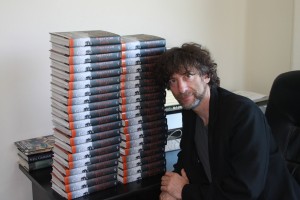I wrote before that consumers obtaining free copies of media online can help the success of copyrighted works, so couldn’t this be taken advantage of by an author? Absoluetly. That’s exactly what writer Neil Gaiman has done with some of his own material, and it paid off.


Gaiman has written a lot of stuff, and you’ve likely heard about his work before, even if his name isn’t ringing a bell. Gaiman’s written novels, children’s books, young adult fiction, short stories, TV episodes, movie screenplays, comic books, and a video game (just to cover a few things). And so much of that has been pirated in one way or another.
Gaiman’s been dealing with piracy for many years now, and he’s developed a philosophy that helps him deal with his life as a pirated author, and work to make things better for everyone. By reviewing data on book sales, Gaiman understood that the piracy may not be as bad as he feared. In the end, Gaiman chose to improve piracy rather than fight it.
Gaiman’s story began when he found encountered a horror that would disturb any author: His work being posted freely on the internet… without his permission! Despite being an author, didn’t fully understand copyright laws at first. He was afraid he would lose his copyright. Overall, he felt that his readers had made him a victim of piracy .

“I’ve been betrayed. I need to be alone…”
But he soon realized that his works were being translated into other languages, and that his books began selling much more in countries where English isn’t the most popular language. This gave Gaiman a new view of piracy. To him, piracy is similar to lending material to friends. Piracy, like lending books, raises awareness of an author.

Gaiman convinced his publisher to release his popular book American Gods online for free for a month. As Gaiman suspected, he didn’t lose book sales by sharing his own book for free, but gained them. By taking the time to understand why his readers were pirating his work, Gaiman used that to develop a better business strategy with his publisher. He now sees piracy in a new way…
“You can’t look on that as a lost sale. It’s not a lost sale. Nobody who would have bought your book is not buying it because they can find it for free.”
Hear Gaiman’s story from the man himself:

I think Gaiman’s story shows us something very important: The problem with piracy is not necessarily that people are sharing works or that sales are being lost. The problem is that the author wants to be the one to deliver their work to their audience and meet their audience’s needs. While many copyright holders respond to piracy by trying to stop the illegal sharing, others try to improve the sharing process by making it legal by making the authors the ones who share some work for free.
